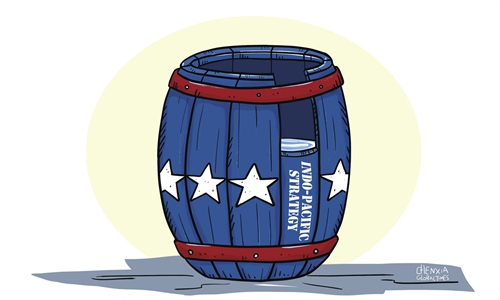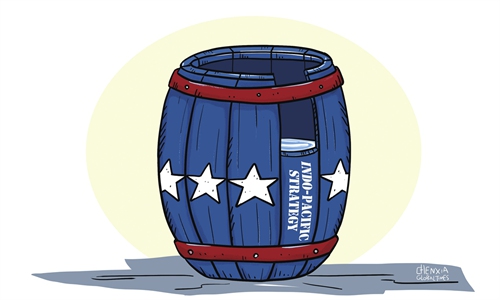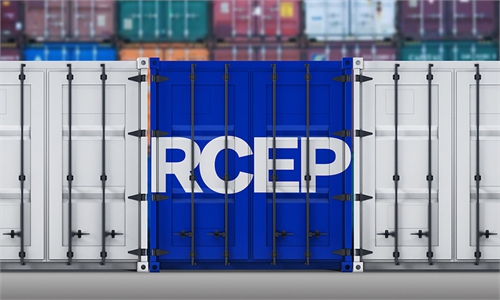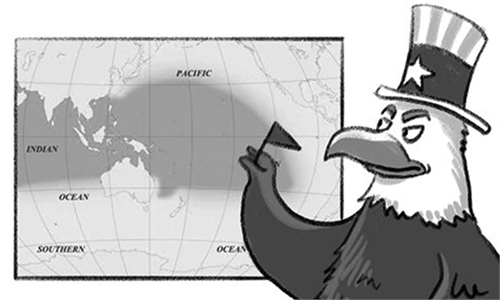COMMENTS / EXPERT ASSESSMENT
US tries to contain China with new Asia-Pacific economic framework

Illustration: Xia Qing/GT
In a fresh sign that the US' at its wits end trying to rebuild economic clout in the Asia-Pacific region, something that has faded into invisibility since its withdrawal from the Trans-Pacific Partnership (TPP) in 2017, the Biden administration is purportedly ready to unveil a new economic strategy for the region, where a China-participating mega trade deal has been all the rage.The new Indo-Pacific Economic Framework, envisioned to fix the US' trade gap in its Asia-Pacific strategy without offering genuine pro-trade incentives, crystallizes the hypocrisy of the US government that intends to exploit the regional digital trade prowess and supply chain robustness for its self-motivated confrontation against China.
On the part of major regional economies that have increasingly benefited from their economic and supply chain closeness with China, it has never been clearer which country is the real threat to regional integration and world order.
The new framework, the Biden administration's first broad economic strategy for the region, is expected to be unveiled within weeks, according to the Wall Street Journal.
As part of the new strategy, Washington is eyeing more intimacy with the region on digital trade, supply chain, among other issues, according to the report. It disclosed however that the Biden administration isn't ready for the offering of which its trading partners truly aspire for, such as tariff cuts and market-opening measures.
That US jobs and manufacturing might be put at a disadvantage in case of the introduction of pro-trade measures was cited as dissuading the Biden administration from taking any substantial moves, in a manner reminiscent of the US' habitual use of similar excuses to justify its multi-pronged trade war.
Instead of striving for true benefits for the Asia-Pacific region that has never been more integrated with the implementation of the Regional Comprehensive Economic Partnership (RCEP), the US has unmasked itself as a true troublemaker.
Years after its TPP exit and a deliberate indifference to the new iteration of TPP, the Comprehensive and Progressive Agreement for Trans-Pacific Partnership (CPTPP), the US has portrayed itself as a negligible part of regional trade. That means the regional trade regime and supply chains have been well up and running without the US engagement and if Washington has plans for reengagement to avail its strategic face-off against China, the regional economy would be at risk of supply chain chaos.
China's supply chain resilience and its digital trade strength are considered a pillar of the global economic recovery amid COVID-19. Adding wings to the tiger, the 15-member RCEP, the world's largest free trade agreement encompassing about one-third of the world's GDP, is seen as cementing China's role as a ballast to regional interconnectedness and global growth.
One of the RCEP's main highlights is its rules of origin that have widely been reputed as more accommodating than other regional trade pacts for businesses to claim tariff preferences. This has apparently consolidated regional advantages and enhanced regional supply chain integration.
As of January 25, not even one month after the RCEP's implementation at the beginning of the year, China's export-oriented firms had been granted 24,695 certificates of origin and declarations of origin under the RCEP framework, for 9.25 billion yuan ($1.45 billion) worth of products, Chinese customs data showed.
China has already applied for CPTPP accession, further establishing itself as a beacon for global trade liberalization.
With the Asia-Pacific economy gaining a tailwind from RCEP-powered regional integration, paving the way for the regional economy to grow stronger amid the China-led economic globalization, what the US has been hypocritically proposing will most likely end up going unheeded.
The author is a reporter with the Global Times. bizopinion@globaltimes.com.cn




